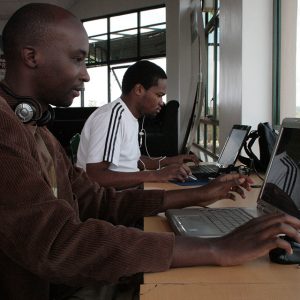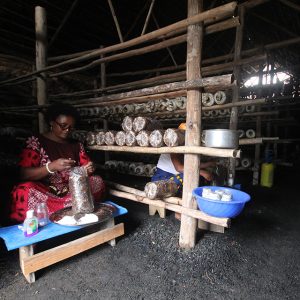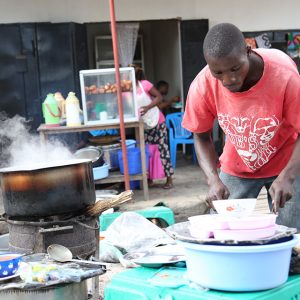Learning relates to staff and partner lessons, as well as our links to global knowledge. Our aim is to continuously learn and adapt from our own activities, monitoring and evaluation exercises, and also to contribute to global knowledge and debate by offering our own lessons on the core hypotheses underpinning our Theory of Change.
_______
LEARNING BY DOING
> Tracking Practice
CULTURE OF LEARNING
WHAT'S NEW
WHY IT MATTERS
Our use of the term learning is deliberate. In fostering innovation and curiosity, we work with the idea of organisational learning, individual learning, of learning by doing and of reflection on our actions as well as on the frames and discourses that shape the field. We believe that staff members are responsible for their own growth, that learning never stops and it ought to continue outside the Twaweza “walls” – while at the same time, we want to ensure that the organisation does the best it can to promote learning and innovation among its staff.
The internal learning activities managed by Twaweza’s Learning, Monitoring and Evaluation (LME) Unit aim to contribute to a professional and competent work environment and to improve the quality of the work produced at Twaweza.
An outline of each type of activity is provided below with further detail in the Internal Learning Overview.
INSPIRING CURIOSITY
The flexibility embodied in Twaweza’s approaches to our work is designed to leave space to adapt to changing contexts and emerging lessons. We commit ourselves more firmly to the destination than to the routes we want to take. This means that all staff need to be imbued with a natural sense of curiosity and a willingness to think differently: how can I achieve what I need to (not what will what I want to do come to achieve?).
And so project planning and reviews are governed by a rigorous peer review system designed to inform and improve interventions and challenge staff to articulate change pathways more sharply. For every project, the responsible officer must write a short pitch document and present the project to the Senior Management Team and other colleagues for feedback and a final decision on whether to proceed. In this way, we benefit from different areas of expertise and hone our powers of persuasion.
We systematically collect monitoring data and push to turn results around quickly enough to be of use to those who are implementing. We encourage staff to constantly review their design, progress of implementation and movement towards intended outcomes, and we support them to do it rigorously. The data collected include media coverage of advocacy efforts and tailored monitoring around specific implementation pieces to answer the key questions of coverage (reach), quality, and feedback from end-users and even short-term effects.
And we conduct joint post-implementation reviews of many of our projects on what has worked and what hasn’t in a particular initiative (or component of the initiative) and how these lessons inform further work.
RESEARCH AND EVALUATION ADVISORY GROUP
We convene bi-annually our Research and Evaluation Advisory Group. We invite a selected group of researchers [link to PDF of members] to join us in shaping Twaweza’s rich mix of design, implementation, evaluation and research by becoming members of the Research and Evaluation Advisory Group. Twaweza will benefit from their deep knowledge and research experience, and they will benefit by engaging with other governance thinkers and experts in this group, possibly finding opportunities to explore their own hypotheses, and jointly guiding the path of a unique practitioner-research hybrid organization.
The Research & Evaluation Advisory Group will engage in the following activities:
- Provide substantive input, suggestions, and feedback on Twaweza’s current and prospective evaluation and research questions, hypotheses and methods
- Review research findings arising from the above and suggest future directions, linking with ongoing research and research gaps in the education, governance, and transparency and accountability fields in East Africa and globally
- Support Twaweza’s research dissemination efforts by identifying specific opportunities to link findings with national, regional and international opportunities for engagement and contributions to the various fields
- Identify potential partnership and collaboration opportunities for Twaweza with other research initiatives and researchers
- Advice on Evaluation and Research for Twaweza’s next strategic phase
STRUCTURED SHARING
Reading Club
Reading Club is designed to strengthen analytical skills and critical reading and thinking among staff. Articles are selected through staff suggestions and cover a range of topics related to the organisational theory of change and goals. These take place on the first Tuesday of every month and we welcome outside participation.
Learning Sessions
Often the daily pressures of delivering work and making things happen take precedence over engaging critically with Twaweza’s theoretical framework and sectoral focus. The compulsory learning sessions provide some time for staff to be exposed to new ideas and ways of thinking about Twaweza’s work, particularly the Theory of Change, the sectors in which we work (education, health and water) and citizen agency. Internal and external experts provide interactive presentations on a range of topics on the second and fourth Tuesdays of every month.
Skills Labs
The Skills Lab allows Twaweza staff and partners to benefit from the practical and technical knowledge of other staff members or outside experts. The aim is to expand practical skills, relevant for work and personal development. Everything from writing a contract to sharpening your work with excel to GIS mapping can be covered in Skills Labs which are held on the third Tuesday of every month.
Food for Thought
Over lunch, Food for Thought sessions provides an informal space for fostering imagination for new ideas and work-in-progress, as well as for interesting and inspiring external people and initiatives (including our implementing partners) to present ideas, concepts and work. They also often provide an opportunity for staff to share their own work for wider feedback. There is no set schedule for these sessions but the idea is to hold one a week.
Immersion
For one week each year, Twaweza stays in communities outside of the large cities, getting a small ‘window’ into the daily lives of ordinary citizens. As our work is founded on the idea that people are making change happen on a daily basis, we take time each year to ‘tune in.’ Immersion allows us to listen and see how people live and negotiate life, communicate, dream, and aspire. We look at how people experience services such as schools, water and health; and we look at how people solve problems and get things done. We do that through observation and conversation, hanging out and engaging, rather than through formal research or surveys. From past experience, we find that our hosts are just as curious about ourselves and the lives we live in the East African capital cities. We avoid the temptation of giving advice and instead share our own stories. We always have our assumptions and thinking challenged, and come back with greater confusion, insight and inspiration.
GLOBAL KNOWLEDGE
Twaweza is contributing significantly to the global debate and knowledge on open governance through a number of our collaborations. These also provide an important global reach and profile for our ideas, approaches and insights and enthuse us with new ideas, approaches and lessons to apply to our work.
We are a member of (and we helped to co-design) new transparency, accountability and participation (TAP) Learning Collaborative, convened by the Transparency and Accountability Initiative. The Collaborative has three reinforcing objectives: a) to test the hypothesis that organisations that are smart about learning are more effective in reaching their stated TAP goals (and clarify constraining and facilitating factors to being an effective learning organisation), b) to accelerate learning among TAP organisations with a focus on those in the global south, and c) to increase engagement between practitioners and researchers as well as funders and better integrate practitioner evidence and priority questions into the global TAP research and advocacy agendas.
We are members of the Global Partnership for Sustainable Development Data (GPSDD) and, since June 2017, have a seat on its Board. The GPSDD drives action at the local, national, and global level to ensure the new opportunities of the data revolution are used to achieve the Sustainable Development Goals. Twaweza is one of 300 organisations joining forces to take action, galvanise political commitment, build trust, and spur innovation in the booming data ecosystems of the 21st century.
We are also members of the Steering Committee of the Open Government Partnership (OGP). The OGP, with a growing membership of 76 countries, 20 local governments, and thousands of civil society organisations, is serving as a positive global movement for deepening democracy and openness, and a countervailing force against the rise of closed government. Twaweza serves on the OGP’s Thematic Leadership Subcommittee and on the Council of the OGP Trust Fund.




